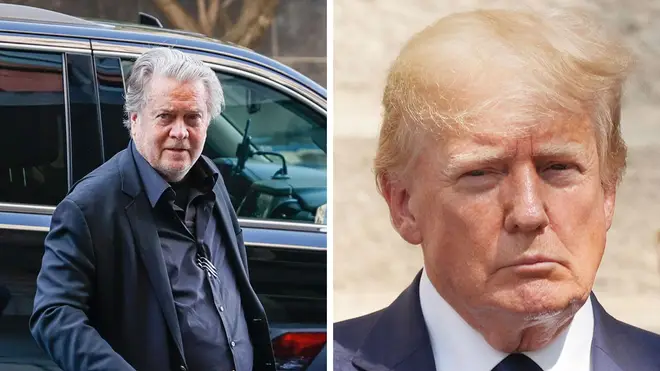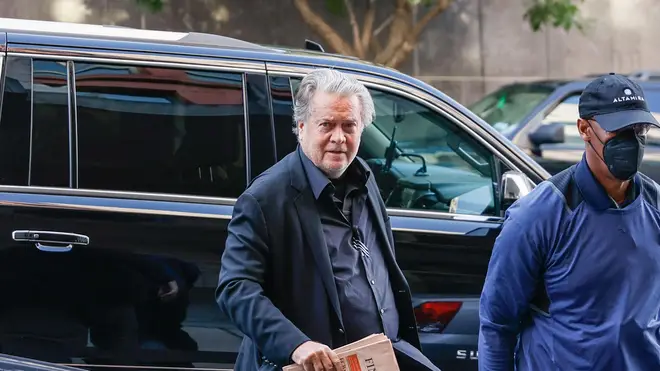
Ian Payne 4am - 7am
22 July 2022, 19:57 | Updated: 22 July 2022, 22:15

Donald Trump's top ex-adviser Steve Bannon has been convicted of contempt charges for skipping a hearing on the US Capitol riots.
Bannon - a long-time ally of Mr Trump - defied subpoenas from the January 6 House committee investigating the riots at the US Capitol in Washington DC.
He was convicted after a four-day trial in federal court in Washington on two counts: one for refusing to appear for a deposition and the other for refusing to provide documents in response to the committee's subpoena.
The jury of eight men and four women deliberated just under three hours.
He could be jailed for up to two years when he is sentenced on October 21. Each count carries a minimum sentence of 30 days in jail.
Bannon had initially argued that his testimony was protected by Mr Trump's claim of executive privilege.
But the House panel and the Justice Department contend such a claim is dubious because Mr Trump had fired Bannon from the White House in 2017 and Bannon was thus a private citizen when he was consulting with the then-president in the run-up to the riot on January 6, 2021.
The riot saw thousands of Trump supporters storm the iconic Capitol building, interrupting an electoral vote count.
Read more: Former Trump aide Steve Bannon surrenders to FBI over contempt of Congress
Read more: Former Trump aide indicted on two counts of contempt of Congress

Bannon's lawyers tried to argue during the trial that he did not refuse to cooperate and that the dates "were in flux".
They pointed to the fact that Bannon had reversed course shortly before the trial kicked off - after Mr Trump waived his objection - and had offered to testify before the committee.
In closing arguments on Friday morning, both sides re-emphasised their primary positions from the trial.
The prosecution maintained that Bannon wilfully ignored clear and explicit deadlines, and the defence claimed Bannon believed those deadlines were flexible and subject to negotiation.
Bannon was served with a subpoena on September 23 last year ordering him to provide requested documents to the committee by October 7 and appear in person by October 14.
He was indicted in November on the two counts of criminal contempt of Congress, a month after the Justice Department received the House panel's referral.
Bannon's lawyer Evan Corcoran told jurors on Friday in his closing arguments that those deadlines were mere "placeholders" while lawyers on each side negotiated terms.
Mr Corcoran said the committee "rushed to judgment" because it "wanted to make an example of Steve Bannon".
Mr Corcoran also hinted that the government's main witness, January 6 committee chief counsel Kristin Amerling, was personally biased.
Ms Amerling admitted on the stand that she is a lifelong Democrat and has been friends with one of the prosecutors for years.
Mr Corcoran also vaguely hinted that the signature of January 6 committee chairman Rep Bennie Thompson looked different on the subpoena than on other letters but dropped that topic when the prosecution objected.
Prosecutors focused on the series of letters exchanged between the January 6 committee and Bannon's lawyers.
The correspondence shows Mr Thompson immediately dismissing Bannon's claim that he was exempted by Mr Trump's claim of executive privilege and explicitly threatening Bannon with criminal prosecution.
"The defence wants to make this hard, difficult and confusing," said Assistant US Attorney Amanda Vaughn in her closing statement.
"This is not difficult. This is not hard. There were only two witnesses because it's as simple as it seems."
The defence on Thursday motioned for an acquittal, saying the prosecution had not proved its case.
In making his motion for acquittal before US District Judge Carl Nichols, Mr Corcoran said that "no reasonable juror could conclude that Mr Bannon refused to comply".